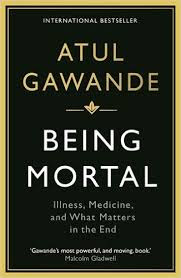
This is a great book about something we all have to face at some point: death. It’s written from a doctor’s perspective, which is interesting, because you would expect doctors to be experts on the subject. Gawande however makes it clear that they are not. Doctors are really focused on life – on sustaining it at all costs – and really have little training on what to do about death. It’s unfortunate then that death in our culture is now very much in their hands, as the end of lives are increasingly medicalised.
And the end of our lives are getting longer and longer, with us all facing decades of frailty. Incredibly, average life expectancy in the Roman Empire was just 28, and in the US in 1900 it was still under 50, and its only recently that the 80s have been reached, so really we are very new to all this. Right now our solution is: hospital. As recently as 1945, according to Gawande, most deaths in the US occurred at home, but now they mostly happen in hospital.
The book really made me think about what I hope will be my long old age. Currently many care homes ‘protect’ the elderly to the point that they rob them of all the things that make life worth living – they are not allowed to dance, to keep pets, sometimes even to walk. For the terminally ill, there is very little understanding of how to talk about the inevitable, with many patients not entering hospice when they probably should. Amazingly, studies are now showing that those entering hospice sooner actually live longer than those who are ‘treated,’ reporting greater levels of happiness – and – get this – their relatives reportingt a more manageable level of grief after they die.
I highly recommend this book. We’re all likely to live a very long time, which means we have a lot of years to be old and ill. As Philip Roth cheerfully put it: “Old age is not a battle. Old age is a massacre.”
